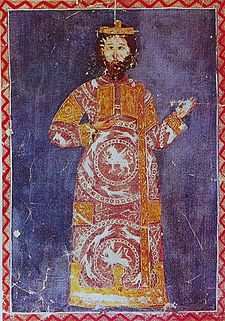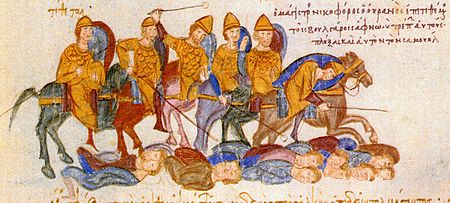 There are some things you take for granted that you would miss if they were gone. Like your knees. And other things whose absence you take for granted that you would really hate if they were here. Like invaders ravishing your country.
There are some things you take for granted that you would miss if they were gone. Like your knees. And other things whose absence you take for granted that you would really hate if they were here. Like invaders ravishing your country.
So tip your leather cap to Edward the Elder and Aethelred of Mercia, definitely not the Unready guy, because on August 5 of 910 AD in the Battle of Tettenhall they and their soldiers laid an old-time beating on Vikings invading western England from Northumbria. It was part of the gradual reestablishment of order that began with Alfred the Great’s pivotal victories over the Danes and continued under his son, which is Edward the Elder, and also his Alfred’s daughter Aethelflaed, Lady of the Mercians, wife of Aethelred and a formidable military and political leader in her own right.
Indeed, after Aethelred died in 911, she ruled Mercia until her own death in 918, winning battles and capturing kings. Do not suppose that women’s rights were invented in 1963, or that history is an unbroken story of progress from the dark and dismal past to our own bright and glorious time on earth. But I digress.
The victory at Tettenhall was not the end of England’s troubles. It was conquered by Danes, then a William, and faced threats from Spain to France to Germany to the Soviet Union. But August 5, 910 did see the defeat of the last army of marauding Vikings to ravish the land. After that it was a gradual process of restoring order and uniting the land.
Not that armies never marauded or ravished again, including both sides in the English Civil War. Indeed the Danes did come back a century later. But from the first ominous appearance of the longships recorded in the Anglo-Saxon Chronicle in 787 (“And in his [King Bertric’s] days came first three ships of the Northmen from the land of robbers”) there was the very real prospect of the whole society foundering in bloodshed and chaos as Roman Britain had three centuries earlier when the Saxons were the bad guys. Tettenhall was pretty much the end of that threat.
The reappearance of the Danes in the late 10th century, and Aethelred the Unready’s blunder in paying them “Danegeld” to go away… and come back next year… had a different character. It did involve plunder and the threat of devastation, and was ominous for the political stability of the realm. But the logical outcome of the eventual decision to fight rather than pay ever more tribute was a Danish conquest of England (under Sveyn Forkbeard, then Canute the Semi-Great, then Harold Harefoot and Harthacnut the dismal) and an effort to rule it peacefully, not the ongoing devastation of the 9th century.
Now I know you don’t get up in the morning and peer anxiously round the lintel to see if the guys in fur and helmets are running up the walk with swords and torches. You don’t even wonder idly as you scramble eggs whether they might do so next week. You just assume they won’t. But they once did, and it’s only because of people like Edward, Aethelred and Aethelflaed that they stopped.
Now take care of your knees. Because they’re kind of the opposite of Viking invasions in being nice to have. But very similar in that life is very different depending whether you have them or not.





